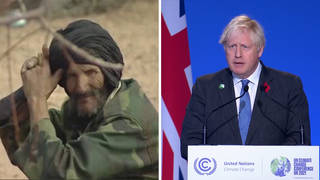
Activists are criticizing the British government for excluding Western Sahara, occupied by Morocco since 1975, from the U.N. climate summit in Scotland. Meanwhile, Morocco is counting renewable energy developments in Western Sahara towards its own climate pledges. Sahwari activists and the Sahrawi government in exile known as SADR, the Sahrawi Arab Democratic Republic, have described this as climate colonialism. Negotiators from Western Sahara independently announced a plan to reduce carbon emissions outside COP26, as the climate crisis has brought extreme weather conditions including drought, extreme heat and flooding to the region. In an interview last week in Glasgow, Scotland while COP26 was underway, Oubi Bouchraya Bachir, a representative of the Polisario Front for Europe and the European Union, estimated 30% of the solar energy produced by Morocco “will be produced from within the illegal context of occupation.” We also spoke with climate change consultant Nick Brooks, who has traveled to Western Sahara for decades to carry out archaeological and palaeo-environmental fieldwork and helped release the Sahrawi climate plan adjacent to the COP26. “They have been completely and systematically excluded from international processes of climate governance and climate finance,” Brooks said of the Sahrawi.
This content originally appeared on Democracy Now! and was authored by Democracy Now!.
This post was originally published on Radio Free.